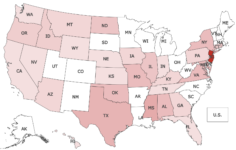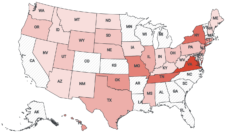 Legislation requiring state agencies to publish official notice on their websites was killed last week in committees in Indiana, Georgia and West Virginia.
Legislation requiring state agencies to publish official notice on their websites was killed last week in committees in Indiana, Georgia and West Virginia.
After passing the House last month by a comfortable margin, Indiana HB-1312 was defeated in a Senate committee by a vote of 8-2. The bill allowed every public notice in the state to eventually be posted on a state-agency website. It was rejected a week after the Hoosier State Press Association (HSPA) organized a statehouse rally at which “more than 100 Indiana publishers, editors, reporters and subscribers gathered outside the Senate chambers” to oppose the bill, according to Johnston County’s Daily Journal.
Legislative floodgates open
 Every January, we are inundated with a firehose of public notice bills gushing from legislatures ranging from Connecticut to California and most states in-between. This year has been no different. PNRC is now following 83 separate pieces of legislation which almost certainly doesn’t include many other most-likely minor bills we haven’t been able to catch up with yet.
Every January, we are inundated with a firehose of public notice bills gushing from legislatures ranging from Connecticut to California and most states in-between. This year has been no different. PNRC is now following 83 separate pieces of legislation which almost certainly doesn’t include many other most-likely minor bills we haven’t been able to catch up with yet.
Indiana adopts digital-newspaper notice
 Indiana Gov. Eric Holcomb signed three bills last month that will impact the state’s public notice laws. When it takes effect on July 1, the most significant bill will make Indiana the first state to authorize government units to publish primary notice on some newspaper websites or e-editions.
Indiana Gov. Eric Holcomb signed three bills last month that will impact the state’s public notice laws. When it takes effect on July 1, the most significant bill will make Indiana the first state to authorize government units to publish primary notice on some newspaper websites or e-editions.
House Bill 1204, which passed both the House and Senate unanimously, allows local governments and state agencies to circumvent the print editions of most newspapers by posting notices in one of their digital products as an alternative. However, the bill only applies to newspapers that distribute fewer than four editions per week; print will remain the exclusive means for government notice in papers that are published more frequently.
February brings more evidence of shift to newspaper websites
 Last month provided additional confirmation that state legislatures are increasingly looking to newspaper websites rather than government sites to supplement and perhaps eventually serve as an alternative to printed newspapers as the primary medium for public notice. Bills illustrating that trend moved closer to becoming law in both Indiana and Iowa.
Last month provided additional confirmation that state legislatures are increasingly looking to newspaper websites rather than government sites to supplement and perhaps eventually serve as an alternative to printed newspapers as the primary medium for public notice. Bills illustrating that trend moved closer to becoming law in both Indiana and Iowa.
Indiana
The tenor of public notice legislation has shifted in Indiana. At the start of 2023 it was one of the two or three states that seemed most likely to abandon newspapers in favor of government websites. Yesterday the legislature approved a bill that could instead serve as a gateway to an eventual migration to newspaper websites.
News websites supplanting government sites as alternative source of notice?
 Public notice legislation introduced so far in 2024 suggests state legislatures are growing increasingly comfortable having news websites serve as an alternative source of official notice. And that comfort seems to have cooled their ardor for moving notices from newspapers to government websites.
Public notice legislation introduced so far in 2024 suggests state legislatures are growing increasingly comfortable having news websites serve as an alternative source of official notice. And that comfort seems to have cooled their ardor for moving notices from newspapers to government websites.
As of the end of last week, new legislation authorizing local news websites or newspaper websites to provide statutory notice in lieu of print had been introduced in at least six states, while bills sanctioning the move from print newspapers to government websites had been introduced in only two states — and one of them is already dead.
Newspaper notice targeted in multiple states
 Bills have been introduced in at least 15 states allowing or requiring official notice to be published on various platforms other than local newspapers. That’s significantly more legislative activity focused on replacing newspaper notice than last year and approaches the level of the previous election off-year of 2021.
Bills have been introduced in at least 15 states allowing or requiring official notice to be published on various platforms other than local newspapers. That’s significantly more legislative activity focused on replacing newspaper notice than last year and approaches the level of the previous election off-year of 2021.
Public notice in Florida in peril once again
 Our original headline for this story was “Newspaper notice off to good start in 2022.” But late last night we learned that Florida — a state that last year passed a progressive bill paving the way for the eventual migration of statutory notice to newspaper websites — was in play once again.
Our original headline for this story was “Newspaper notice off to good start in 2022.” But late last night we learned that Florida — a state that last year passed a progressive bill paving the way for the eventual migration of statutory notice to newspaper websites — was in play once again.
We haven’t had time to digest the 40-page bill, but it’s clearly designed to undo the work that went into last year’s historic legislation by moving public notice to government websites. The committee bill passed out of the Judiciary Committee this morning with GOP backing on a straight party-line vote.
New Kentucky public notice law maintains status quo ante
 After following a convoluted path that included two different bills, half a dozen amendments, five floor votes and a grand compromise, the Kentucky legislature passed a bill last week ensuring that the state’s public notice law would remain mostly unchanged.
After following a convoluted path that included two different bills, half a dozen amendments, five floor votes and a grand compromise, the Kentucky legislature passed a bill last week ensuring that the state’s public notice law would remain mostly unchanged.
The original public notice provisions of both HB195 and HB351 would have moved all government notice in the Bluegrass State from newspapers to government websites. Following a compromise earlier this year between the Kentucky Press Association (KPA) and the associations representing cities and counties in the state, HB195 was amended to exclude counties with population under 80,000. That amendment brought it closer to the state’s current law — passed two years ago and due to sunset this summer — which allows counties with population above 90,000 to run notices on their own websites; decreasing the population threshold by 10,000 would have increased the number of website-notice-only counties from eight to ten.
Hoosier State Press Association inaugural public notice summit rallies publishers
 A close call during this year’s legislative session put the fear of god into newspaper industry leaders in Indiana. The Hoosier State Press Association responded by convening a Public Notice Summit, which was held Sept. 13 during the association’s annual conference and advertising awards gala.
A close call during this year’s legislative session put the fear of god into newspaper industry leaders in Indiana. The Hoosier State Press Association responded by convening a Public Notice Summit, which was held Sept. 13 during the association’s annual conference and advertising awards gala.
“We had a big scare in our last session,” said HSPA Executive Director Steve Key, referring to a bill that was introduced in the state House that would have eliminated foreclosure notices in Indiana newspapers. “The bill got a hearing but died in a Senate committee.”
When the city learns what the county is doing by reading the notices
 The City of Hobart, Indiana, is suing a local restaurant owner after learning he breached a mortgage agreement for the purchase of the old Hobart Police Department building in the city’s downtown area (that’s downtown Hobart on the left), according to The Times of Northwest Indiana.
The City of Hobart, Indiana, is suing a local restaurant owner after learning he breached a mortgage agreement for the purchase of the old Hobart Police Department building in the city’s downtown area (that’s downtown Hobart on the left), according to The Times of Northwest Indiana.
It’s a complicated story that is part of The Times’ larger investigation of corruption in Lake County’s tax sale process (see editorial below). It caught our eye for one reason. The city learned it was being cheated by reading notices published by Lake County, Indiana in a local newspaper. Here’s how the Times put it:
